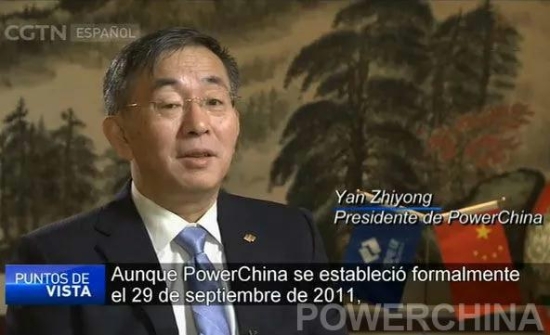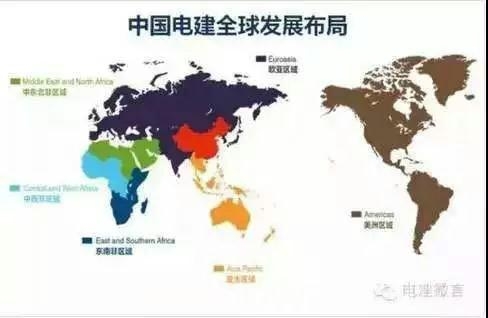Yan Zhiyong, President of POWERCHINA, gave an interview to Chinese national television system, or CCTV sharing his opinions on the development of POWERCHINA and China's hydropower. The programme aired on Oct 1.
 |
| Yan Zhiyong, President of POWERCHINA, interviews by CCTV. [Photo/powerchina.cn] |
Host: First of all, please introduce some important events that took place during POWERCHINA's development.
Yan: Although POWERCHINA was formally established on Sept 29, 2011, some member enterprises of POWERCHINA was established in 1949, the year when PRC was found. . Among them, the oldest has a history of over 60 years. POWERCHINA overcame a lot of difficulties after its establishment. In 2012, we ranked 390th among Fortune 500 companies. Nowadays, the world's top hydropower projects are in China and most of the planning and design of these projects are made by us. Our construction company also undertook more than 65 percent of all construction work.
 |
| POWERCHINA has distributions across the globe. [Photo/powerchina.cn] |
Host: What are POWERCHINA's advantages compared to its foreign counterparts?
Yan: Among the large-scale enterprises in the world, POWERCHINA has its own unique advantages and capabilities in understanding water and electricity, project designing and construction, investment and operations. Currently, we primarily invest in electricity, but in the future we will put more investment in new energy generation. Our installed power generation capacity has reached 12 million kilowatts, equivalent to a large-scale power generation enterprise in Europe.
We also operate highways and real estates. That's why we have stronger economy capabilities compared to ordinary construction companies and can better adapt to the needs of the modern market. At the 6th anniversary of the founding of POWERCHINA, we promoted structural adjustment, restructuring and upgrading to ensure that we can achieve sustainable development. Under the pressure of international economic downturn, POWERCHINA has maintained rapid growth for six years since its establishment with an average annual growth rate in the value of more than double digits. On the Fortune 500 list, we ranked 390th in 2012 and 190th this year, up 200 places in merely five years.
Host: Please tell us why and when POWERCHINA implements the going-out strategy and its achievements.
Yan: POWERCHINA has built a number of world-class hydropower projects. There are not many companies can compete with us in regards to planning and construction of water conservancy and hydropower projects, not to say the overall capability and the advantages in meeting the needs of developing countries. We have the ability to provide these countries with services they need and in turn achieve better development. After we thoroughly studied these issues, we made it clear that we must speed up the "going out" process. There are similar companies in developing countries which have some gaps with us in technology and economy. We came to these countries not only for projects, but also for creating more jobs and improving local living conditions. We hope local industries and enterprises participating in the projects can achieve development. Of course, POWERCHINA will also benefit from their development.
Host: Could you please outline POWERCHINA's businesses in Latin American countries?
Yan: In recent years, we have started regarding Latin American countries as an important area for us to achieve globalization. Our South American regional headquarter is in Barnabas. And we have close contact with enterprises and governments in Brazil and Argentina. While giving full play to our advantages in water conservancy and hydropower projects, we take the initiative to study the development trends of Latin American countries and we found they are promoting the development of new energy sources. The 300 MW solar photovoltaic power generation project undertaken by POWERCHINA is the largest of its kind in Argentina and Latin American countries.
Host: The Belt and Road Initiative is a major global proposal put forward by the Chinese government. I want to know if there are new opportunities for POWERCHINA's overseas business brought by the Belt and Road Initiative.
Yan: The Belt and Road Initiative based on the principles of joint discussion, co-construction and sharing has got widespread response in the world. I learned that Belt and Road Initiative showcased China great attempt to take the responsibility as a great power when the world economic development is in a downturn. Therefore, we started with the implementation of "co-construction". When we are in overseas countries, we will try our best to use local enterprises that are able to participate in project construction. Of course, we will employ local people according to the market rules. We recognize that co-construction not only refers to people but also to the conceptual integration.
We also construct projects based on the principal of co-sharing. We help improve local employment and bring them economic benefits. We want to achieve technology and management sharing through construction projects to promote such countries' technical ability and management level.